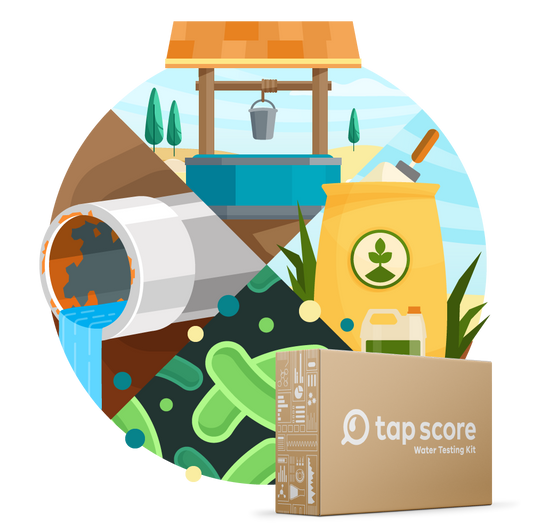
Bottled Water Fads Exposed
Our blog is written by real experts— not AI. Each guide is carefully reviewed and updated based on the latest research. Plus, with no affiliate links, you can count on unbiased insights you can trust.
Healthy or hoax? Everything you want to know about the latest water trends in the wellness world.
Leave it to the ever-growing consumer market to unleash an inundation of new drinking water trends. The already oversaturated bottled water market has prompted manufacturers to start setting their products apart. How are brands doing this with something as basic as water? The answer: Functionality.
Plain, old H2O is now having to stand up against trendy options like protein water, alkaline water, hydrogenated water, hyper-oxygenated water, and even CBD water. As consumers angle away from sugary, calorie-dense sodas, functional waters are gaining more and more space on store shelves. Many of these brands are touting an array of health benefits—ranging from preventing cancer to reducing anxiety.
We’ve done some digging into the most talked about water trends, here’s what we’ve learned.
Table of Contents:
What Is Functional Water?
Functional water is “enhanced” drinking water marketed to improve your health or elevate your drinking water experience through specialized additives. Some are chemically altered (i.e. by adding increased oxygen or hydrogen); some are simply infused with oils, extracts, or flavors. While bottled water has long been criticized for contributing to environmental waste, the convenience and potential added perks of functional water have kept the industry booming.
Some of the biggest players in the game have created not only new types of products, but all-out crazes. We’ve investigated the following functional water fads and will let you know if we’re drinking the “kool-aid” (so-to-speak).
Alkaline Water
Alkaline water, also known as ionized water, is often considered a type of functional water due to its altered pH level and the potential health claims associated with it. The process of ionization typically involves using an ionizer which employs an electric current to separate incoming water into two streams, one with a raised pH containing a higher concentration of negatively charged ions, such as hydroxide ions, and one with a lowered pH containing more positively charged ions. The water with the increased pH is considered the alkaline water.
We’ve already done some myth-busting in regards to alkaline water, but here’s a recap...
What Is Alkaline Water?
The rage regarding this type of water surrounds its pH (potential hydrogen). A measure of the relative amount of free hydrogen and hydroxide ions in the water, pH is a logarithmic scale ranging from 0 to 14. Each step of the scale corresponds to a ten-fold change in acidity– liquids closer to 0 are very acidic, whereas those nearer to 14 are very basic or alkaline. Pure water has a pH of 7.0 (and is considered “neutral”).
Alkaline water generally has a pH between 7 and 9.5– due to having a higher concentration of alkali compounds (such as sodium, potassium, magnesium, and calcium).
What’s the Claim?
Alkaline evangelists claim that by neutralizing acid in the body (via consuming alkaline food/beverages), the following will occur:
- Increased fertility
- Increased energy
- Regulate your internal pH level
- Prevent diabetes
The list goes on and on. Some even purport that that alkaline water prevents cancer. (Spoiler alert: It doesn’t). But, how did these grandiose, cure-all claims come to be? Here’s the general (and flawed) logic:
Cancerous cells can’t survive in a highly alkaline environment. This is true. Additionally, areas in close proximity to the cancer cells turn acidic. Also correct. Therefore, it follows that if you increase your body’s overall alkalinity, you can kill/prevent cancer cells from growing.
What’s the Verdict?
While that logic above appears to (almost) add up, there is one key issue with this claim: While cancer cells can’t live in highly alkaline environments, neither can any of your other cells…
So even if alkaline water were able to shift your body’s acid-alkaline balance (which it can’t, by the way), it wouldn’t be good news for any cells in your body (forget just the cancerous cells!).
Your body works hard to maintain a safe pH environment of around 7.4—pretty much no matter what. So alkaline water does not change your body’s pH. It gets digested with your stomach acids like all the other foods you consume. The scientific community has yet to rally behind the miracle properties of alkaline water. What is known is that if you do drink lots of the alkaline liquid, most of what happens is that you excrete alkaline urine.
Hydrogen-Rich Water
What is Hydrogenated Water?
There’s a lot of confusion surrounding this particular functional water fad—as it is often confused as alkaline water, or even as water molecules with “extra” hydrogens. It’s neither of these things. Simply put, hydrogen-rich water is just infused with molecular hydrogen by dissolving H2 gas in the water.
What’s the Claim?
So, is hydrogenated water good for you? The hype surrounding hydrogen-rich water is predicated on the fact that hydrogen shows antioxidant activity that results in lower “oxidative stress” which is associated with negative health outcomes. Proponents claim that hydrogen-rich water protects against free radicals, which can damage cells and lead to disease.
What’s the Verdict?
Hydrogen-infused water is generally recognized as safe (GRAS Certified) by the FDA and continues to receive accolades and testimonials from folks who attest to the natural benefits of consumption.
While it's not "snake oil" per se, hydrogenating water has an inadequate evidence base to claim tangible health benefits. The few studies that exist are limited in scope and don't definitively explain how different doses of hydrogenated water results in changes to cellular processes. It's unlikely that this version of trendy water is harmful, but we don't necessarily think it is worth the extra dollar until scientists continue their research into the potential benefits.
Structured Water
What is Structured Water?
Structured water, also referred to as magnetized or hexagonal water, is water allegedly made up of molecules arranged in a hexagonal structure with the chemical formula “H3O2” instead of the regular H2O. There are a variety of claims surrounding how structured water is made, with some methods including using magnets to create a magnetic field near the water, charging crystals and placing them in the water, or exposing the water to sunlight or another source of UV radiation.
What’s the Claim?
Companies promoting structured water claim it offers numerous health benefits, including increased energy, enhanced concentration and memory, toxin removal, improved digestive health, and even an extended lifespan.
What’s the Verdict?
To put it plainly, structured water is a marketing scam. There is no evidence to support the claims surrounding the health benefits of structured water, and many of them can be easily disproved. The most glaring issue with the idea of structured water is the assertion that it has a chemical formula of H3O2. H3O2 is not a real molecule, and even if it were, it would not be water, but instead an entirely different substance. Additionally, it has been proven that exposure to magnetic fields and sunlight does nothing alter the fundamental properties and composition of water. While it is unlikely that this water is harmful (and more likely that it is just plain old bottled water) we would not recommend spending extra on structured water.
Oxygenated Water
What’s Oxygenated Water?
Oxygenated water is water that has been infused with dissolved oxygen molecules. This is typically achieved through a process where oxygen is forced into the water under pressure, resulting in higher levels of dissolved oxygen than regular water.
What’s the Claim?
Proponents of oxygenated water claim various health benefits, including increased energy levels, improved athletic performance, enhanced cognitive function, and better overall well-being. Some suggest that the additional oxygen can improve oxygen delivery to cells and tissues, potentially boosting metabolism and reducing fatigue.
What’s the Verdict?
Scientific research on the benefits of oxygenated water is limited, and the evidence supporting these claims is mixed. While some studies suggest potential benefits, such as improved exercise performance in certain conditions, others have found no significant differences between oxygenated water and regular water. Overall, more rigorous research is needed to determine the true efficacy of oxygenated water.
CBD Water
What’s CBD water?
CBD water is a type of functional water infused with cannabidiol (CBD), a non-psychoactive compound found in cannabis plants. Unlike THC (tetrahydrocannabinol), CBD does not produce a "high" but is believed to offer various health benefits.
What’s the Claim?
Proponents of CBD water claim it can provide several potential health benefits, including anti-inflammatory effects, anxiety and stress relief, pain relief, neuroprotective properties, and general well-being.
What’s the Verdict?
While there is promising research suggesting that CBD may offer various health benefits, the specific efficacy of CBD water is less certain. The low dosage and questions about bioavailability mean that it might not be the most effective way to consume CBD for therapeutic purposes. For those interested in exploring CBD's potential benefits, other forms such as oils, tinctures, or capsules might be more reliable options, provided they are sourced from reputable manufacturers.
As always, it's important to consult with a healthcare professional before starting any new supplement, including CBD products.
Electrolyte Water
What is Electrolyte Water?
Electrolytes are minerals in your body with an electric charge. Electrolyte-enhanced water is often infused with potassium and sodium, which can help your body absorb the water more quickly.
What’s the Claim?
Useful after periods of fluid loss (intense exercise, bouts of vomiting, diarrhea etc.), electrolyte-enhanced water can help prevent and treat mild to moderate dehydration. It can also help prevent muscle cramping.
What’s the Verdict?
While sports drinks do not necessarily contain enough electrolytes to be an adequate resolve for dehydration, after bouts of fluid loss they can be beneficial. However, if you spend your days sedentary, drinking water with electrolytes won’t help you achieve better hydration than drinking regular water because you are not likely electrolyte deficient. We also recommend you always take a look at the sugar content on the label as many enhanced waters have additional (and unnecessary) sugars.
In sum, after sports or being sick, grab electrolyte water, but don’t rely on it for regular hydration—or you’ll just be consuming unneeded sugar and using environmentally harmful plastic.
Caffeinated Water
What is Caffeinated Water?
If you’ve ever had an early Monday morning, you won’t be surprised to know that caffeine is the most popular mood-altering drug in the world. We usually get it from coffee, tea, or colas, but now we have the option to get in from our water.
Unlike the confusion often surrounding alkaline and hydrogen-rich water, caffeinated water is pretty straightforward. It’s water mixed with caffeine to create a tasteless beverage with a jolt.
Depending on the brand, caffeinated water contains anywhere from 45 milligrams to 125 milligrams per bottle. To put that in perspective, the typical cup of coffee has about 95 milligrams of caffeine.
What’s the Claim?
Caffeine is a mild stimulant to the central nervous system and there’s evidence that caffeine may help improve memory, enhance workouts and boost concentration. The claims that have caffeinated water evangelists shouting from the rooftops are typically rooted in the following notions:
- It’s a calorie-free way to get caffeine
- Coffee is dehydrating, and caffeinated water is a good way to prevent possible dehydration
What’s the Verdict?
We’ll address the “calorie-free” part first.
Yes, it's true that caffeinated waters (the ones without added sugar) are calorie-free. But if you typically get your caffeine from coffee or teas—which clock in at 1 and 2 calories per serving, respectively—this isn’t the most compelling reason to switch. While it’s not wrong, we’re much bigger proponents of drinking something out of a nice chemical-free glass or ceramic mug, than a potentially BPA-laden plastic container.
Moving on to the issue of dehydration.
Caffeine—no matter the medium it comes in—is a diuretic. So, if that’s your concern, it doesn’t totally check out. What’s more is that even if you get your caffeine intake from coffee, you are still consuming water (remember coffee is coffee beans plus water). Finally, despite increasing your need to urinate, drinking coffee isn’t actually dehydrating. So, that tick mark that caffeinated water fans put in the victory column is not quite as powerful as they may have you believe.
Infused Water
What is Infused Water?
From cucumber water at spas to asparagus water at Whole Foods (yes, that’s real… and expensive), infused waters can be a great option to add taste without calories. While we aren’t entirely certain why anyone is looking to drink asparagus flavored water, infusing water with citrus fruit or herbs can be a nice twist on the old classic.
What’s the Claim?
The biggest benefit is that you’re likely to drink more water throughout the day. You may also get some small plant-based health perks—like water infused with lemon can add some antioxidants to the mix.
What’s the Verdict?
The greatest thing about infused water is that you can make them at home. No need to buy expensive water that’s packaged in plastic bottles.
Vitamin-Enhanced Water
What are Vitamin-Enhanced Waters?
Vitamin-infused waters, like Vitaminwater or Propel, are beverages enhanced with various vitamins to provide additional health benefits beyond basic hydration. These waters aim to help consumers easily intake essential nutrients that support overall health and well-being. Vitamins may include Vitamin C, B Vitamins, Vitamin E, or Vitamin D.
While the scientific basis for the benefits of these vitamins is solid, the additional benefits of consuming them through water versus other sources (like food or supplements) are not as well-documented. The bioavailability and actual health impact can vary depending on the formulation and individual absorption.
What’s the Claim?
Vitamin-infused waters claim to offer several health benefits based on the specific vitamins they contain, such as immune support, energy boost, antioxidant protection, and bone health.
What’s the Verdict?
Vitamin-infused waters can be beneficial for providing additional vitamins in a convenient form, especially for those who may have specific nutritional gaps. However, it is important to consider the overall nutritional profile, including potential added sugars and artificial ingredients, and to use them as a complement to, rather than a replacement for, a balanced diet and other sources of hydration.
What About Distilled, Deionized, and Tap Water?
Distilled Water
Distilled water is typically not considered a type of functional water. Functional waters usually contain added ingredients, such as vitamins, minerals, or herbs, that offer specific health benefits beyond basic hydration. While distilled water is purified through a process that removes impurities and minerals, it does not typically contain additional functional ingredients. However, some companies may market distilled water as part of their functional water line if they have added specific beneficial components to it.
What is Distilled Water?
Distilled water is water that has undergone a purification process called distillation, where it is heated to create steam and then cooled to condense the steam back into liquid form. This process removes impurities, minerals, and contaminants, resulting in water that is essentially pure H2O.
What’s the Claim?
Distilled water is often claimed to be the purest form of water available, free from contaminants and minerals. Some proponents suggest that drinking distilled water can help detoxify the body by flushing out toxins and impurities more effectively than regular tap or bottled water.
What’s the Verdict?
From a scientific standpoint, distilled water is indeed very pure, as it is free from most impurities and minerals found in other types of water. However, there is no clear evidence to support the claims that drinking distilled water offers significant health benefits or aids in detoxification. In fact, some argue that regular consumption of distilled water may lead to mineral deficiencies, as it lacks essential minerals that are typically found in drinking water.
Overall, while distilled water is safe to drink in small quantities and can be suitable for certain applications like laboratory use or steam irons, its purported health benefits are not well-supported by scientific research.
Deionized Water
Deionized water is also not considered a type of functional water. While deionized water may have certain industrial or laboratory applications, it lacks the added components that are characteristic of functional waters.
What is Deionized Water?
Deionized water, also known as demineralized water, is water that has undergone a purification process to remove ions, including minerals and salts, leaving it essentially pure H2O. This purification process typically involves passing water through ion exchange resins or other filtration methods to remove dissolved ions, resulting in water with a very low conductivity and minimal impurities.
What’s the Claim?
Some proponents suggest that drinking deionized water can offer health benefits by providing pure hydration without the potential contaminants found in tap water or other sources. They argue that removing ions and impurities from water can lead to better absorption and utilization of water by the body, potentially improving overall health and well-being.
What’s the Verdict?
From a scientific standpoint, deionized water is indeed very pure, as it is free from most impurities and minerals found in other types of water. However, there is limited evidence to support the claims that drinking deionized water offers significant health benefits beyond basic hydration. While it is generally safe to drink in small quantities, some experts caution against regular consumption of deionized water due to its lack of essential minerals, which are important for various bodily functions.
Overall, while deionized water may have specific industrial or laboratory applications, its purported health benefits are not well-supported by scientific research for human consumption.
What’s the Difference Between Distilled Water and Deionized Water?
While both deionized water and distilled water are forms of purified water, they are produced through different methods and have distinct compositions. Deionized water is free from ions, while distilled water is free from impurities and minerals. Each type of water has specific uses based on its purity and characteristics.
How Does Tap Water Compare?
Tap water is not typically considered functional water. While tap water does provide essential hydration and may contain trace minerals beneficial for health, it generally does not contain added functional ingredients like vitamins, minerals, or herbs. However, some municipalities may fortify tap water with fluoride for dental health, which could be considered a functional additive.
Key Takeaways
- While functional waters may offer specific health claims, such as improved hydration, energy boost, or antioxidant properties, the scientific evidence supporting these claims is often limited and sometimes mixed.
-
Generally speaking, (and there are exceptions), trendy functional waters won’t harm you. However, if you are buying them pre-packaged in plastic, there is the guarantee of a negative environmental impact.
- Until more concrete evidence emerges, we recommend you keep to your (tested) tap water—as it will cost your wallet and the environment far less.
The bottom line is staying hydrated and eating a balanced, healthy diet remains the best way to ensure you’re getting your necessary nutrients.
For any questions about your drinking water (bottled or tap) you can connect with our team here.
Read More
▾Sources and References
▾- Hydrogen-rich water for improvements of mood, anxiety, and autonomic nerve function in daily life - PMC
- Alkali | Encyclopedia Britannica
- Effect of a supplement rich in alkaline minerals on acid-base balance in humans
- Molecular hydrogen: a therapeutic antioxidant and beyond
- Free radicals, antioxidants and functional foods: Impact on human health - PMC
- Generally Recognized as Safe (GRAS) | FDA









